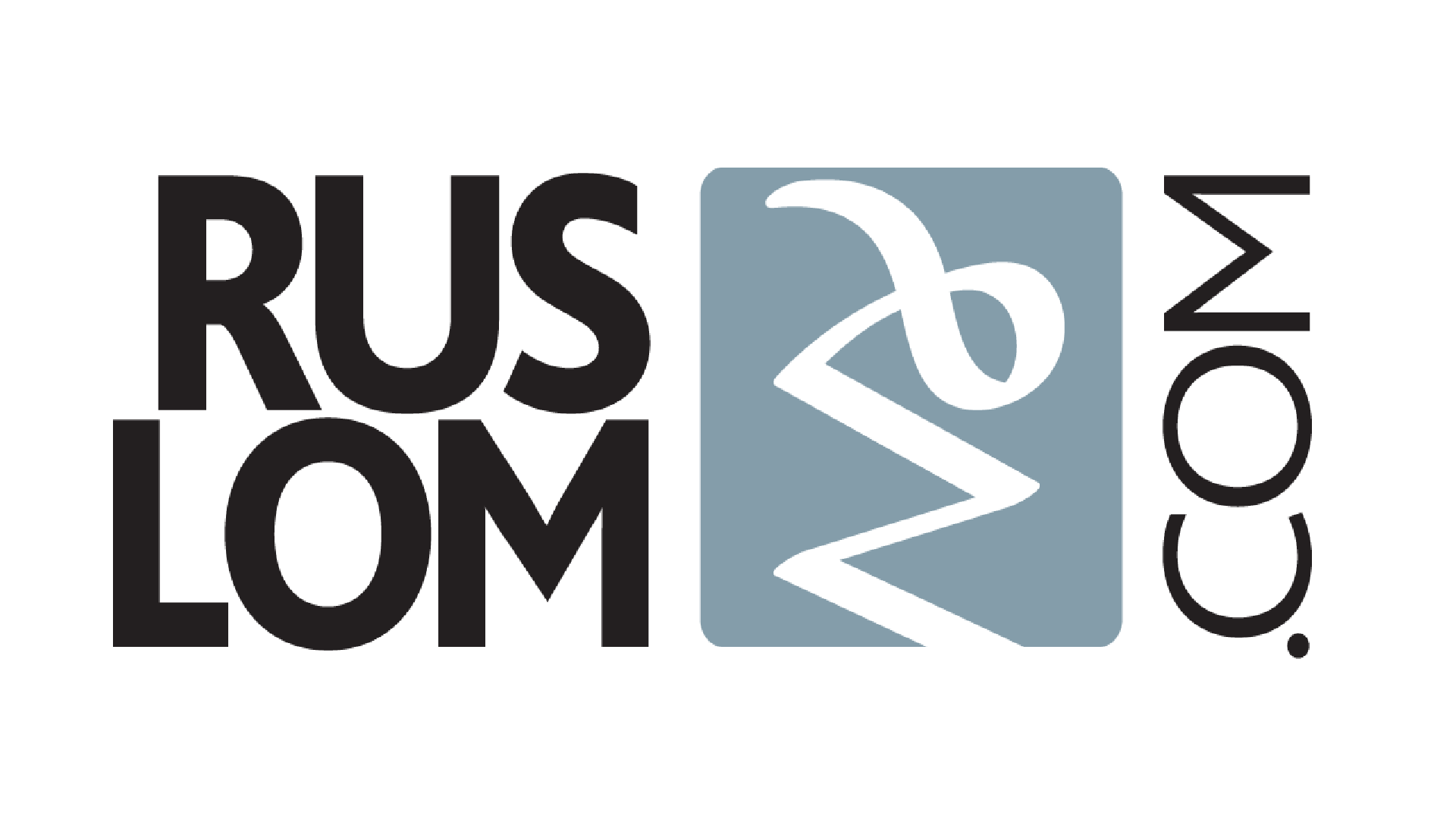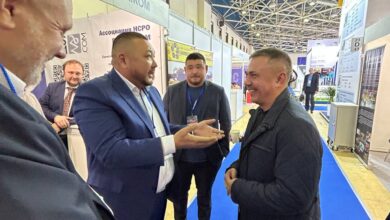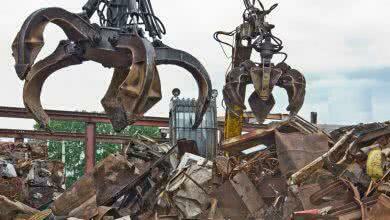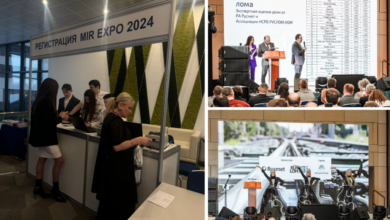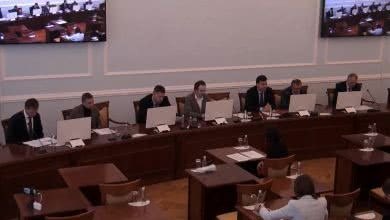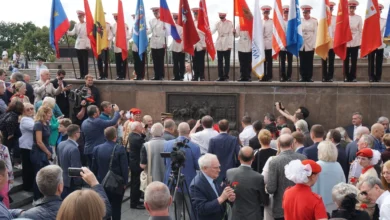The METAL CRUISE business-intensive, a river business cruise organised by Rusmet Rating Agency together with the National Recycling Association RUSLOM.COM, took place in Moscow on 24 October and included a seven-hour programme for professionals from the scrap market, metallurgy, and banking.
Topics included cashless payment for scrap, standardisation and control, analysis and technology. A separate session was dedicated to the lead market. The business cruise programme included 20 expert presentations, an interactive survey of delegates, discussions and networking.
The event was opened by Alexander Sorokin, Deputy Head of the Operational Control Department of the Federal Tax Service of Russia, with a presentation on “Specifics of the use of online cash registers in the transition to cashless payments for scrap delivery”.
The speaker talked about the legal requirements in the area of cash register equipment and non-cash settlements for scrap delivery by individuals. He also answered questions from the audience and highlighted the main risks. For example, the survey of participants showed that a quarter of the respondents considered the obligation to issue a cheque to individuals for scrap to be unnecessary after the transition to cashless settlements with individuals for scrap. The expert stated that such an obligation will remain, but the procedure itself can be optimised by means of digitalisation. Alexander Sorokin reported on the procedures for correcting errors and exempting taxpayers from administrative fines. One of the key points was the possibility for taxpayers to voluntarily submit a written request for the correction of an error. An alternative method, according to the speaker, is to write and send a cash correction cheque to the tax authority. He also noted that one of the main conditions is that the tax authority has no information and documents on the administrative offence committed prior to the taxpayer’s application.
The event continued with a presentation by Natalia Belyaeva, CEO of Delphi LLC, who spoke about the procedure for accepting scrap from individuals, including self-employed and individual entrepreneurs (IE), and the specifics of working with scrap processors after 1 October 2023. The speaker also talked about the differences between the self-employed, individuals and individual entrepreneurs, taxes for individuals and personal income taxpayers.
Natalia Belyaeva also noted that the self-employed and individuals can use the only non-cash method of payment when deliver scrap.
The question of how much scrap can be generated by citizens has become one of the most discussed issues. Viktor Kovshevny, Director of the National Recycling Association RUSLOM.COM, informed the audience about the amount of scrap generated by individuals. The speaker noted that individuals account for 50.7 percent of those who deliver scrap, and the main categories of scrap are household scrap metal and cars.
According to the speaker, individuals collecting scrap increase the efficiency indicator of the national recycling system and the share of “old scrap” in the total volume of scrap. At the same time, the efficiency of scrap collection in Russia in 2022 was two times lower than in developed countries.
Valery Abyzov, Executive Secretary of the Standards, Science, and Education Committee of the Association RUSLOM.COM, highlighted the current issues of standardisation in the field of scrap metal handling and amendments to the Government Resolution 980 on control (supervision).
Marina Uglovskaya, Executive Director of RUSLOM.COM Association, told the audience about the prevention of barriers and accounts blocks when working with banks and the need to unify banks’ approaches to the scrap industry in order to facilitate the transition to cashless settlements.
The next part of METAL CRUISE’s programme was the “Advice for a Million” blitz for banks, where specialists and representatives of financial institutions spoke. The topics of their speeches were: five reasons to work with a particular bank or service; five tips on how to avoid risks when switching to cashless payments; five “harmful” tips on how to create risks when switching to cashless payments.
Among the speakers were: Maxim Zhurav, Managing Director of Gazprombank; Sergey Mokryshev, Senior Vice President, Head of Customer Relations Department of AVANGARD bank; Ruslan Nosov, Project Manager of “Integrated Solution for Scrap Industry” of Qiwi Bank; Anna Reznik, Product Manager of Jump Finance (Tinkoff Bank’s solution for payments to scrap collectors); Artur Avanesyan, Director of Payment Services Department of Mandarin functional payment platform.
The business programme continued with awards for banks and payment systems. Gazprombank, Qiwi Bank, Tinkoff Bank, Almaz, Mandarin, Vtorium, AVANGARD, Promsvyazbank, and Rosbank received the “Leader in Digital Financial Products for Scrap Dealers” award at the event.
The analytical part of the programme started next. In this block Victor Kovshevny, Director of the Association RUSLOM.COM, dealt in detail with the topic of the growth of the demand for metals in the world and presented a forecast for 2023-2030-2050. According to the forecasts for 2050, steel will be on the first place in the demand ranking, while gold will be on the second place.
In 2022, Russia ranks second behind China in terms of influence on the global metals market. At the same time, according to the speaker, Russia has the prospect of occupying 15% of the global market. By 2050, this share will amount to $450 billion, not taking into account sanctions and the projected processes of dividing the world into two blocs. Viktor Kovshevny noted that by 2050 Russia’s weight in metallurgy is expected to increase in the world arena, India will also continue to grow rapidly. In addition, the speaker presented a forecast of the impact of the carbon tax in 2030-2050 on the production of steel, copper, aluminium, and lead.
Maria Bogdanchikova, Director of Marketing and Analytics at Vtorion, spoke about the features of monitoring market prices on the marketplace platform, noting that the growth in purchase volume per month was 28% and the number of shipments through the platform exceeded 12,000 with an average tonnage of 13 tonnes. The speaker also commented on the survey results and discussed with the audience the ferrous scrap price indices in different regions and the key price drivers. For example, delegates identified competition and demand from mills, as well as the move to cashless payments, as key current factors.
The next speaker was Irina Shilyaeva, General Director of CTS (Central Trading System), who discussed with the audience the trend in government regulation in terms of the transition of basic industries to a national price index and what metals and commodities it may be introduced for. She also noted that the CTS together with Rusmet Rating Agency started the formation of joint price indices for copper bars and copper rods (published on rusmet.ru), in the near future it is planned to add aluminium and lead.
Mikhail Gagarin, General Director of Industrial Market LLC, spoke about the benefits of electronic auctions. He noted that, until recently, specialised services for electronic scrap trading were practically non-existent, but now this area is actively developing, as it provides direct access to suppliers and buyers of recyclable materials and minimises the risk of dealing with unreliable players.
Teng Yue, General Manager of Huahong-Rus, the representative office of China’s Huahong Technology, shared the company’s global experience in scrap collection technologies and products. The company is the leading manufacturer of scrap processing equipment in China and supplies to 90 countries around the world. Separately, the speaker said that Hua Hong is not only increasing supplies to Russia, but also developing warranty and maintenance services in the country.
Vladimir Provotorov, an industry expert and business consultant, spoke about intelligent systems in scrap collection and increasing the efficiency of scrap acceptance control. He pointed out that the digitalisation of the scrap procurement and sales stages will help to reduce the number of contentious situations during acceptance and the risks of the “human factor”, which affect the final cost of scrap.
The business programme ended with a session dedicated to the lead market, during which Viktor Kovshevny, Director of the Association RUSLOM.COM, presented an analysis of the lead and lead scrap markets, their price and volume indicators, supply and demand dynamics. He also presented the proposal of Agropribor company, which offers scrap market participants to diversify their business into systematic procurement of lead batteries with subsequent disposal of lead batteries to the plant, which is in constant need of raw materials.
Elena Dmitrieva, Advisor to the General Director of the RUSBAT Association, spoke on “The Russian market of batteries and lead in modern conditions”, presenting proposals for the development of the Russian lead battery industry, forecasts of changes in the structure of the battery market under different variants of import regulation. She also noted that the RUSBAT Association cooperates with RUSLOM.COM in monitoring the market situation and developing proposals to improve the efficiency of raw material procurement and supply of domestic enterprises.
As part of the session, Natalia Belyaeva highlighted the legal aspects of the disposal of used batteries by legal entities and individuals.
The session concluded with a discussion of challenges and opportunities for producers of lead, cable, batteries, and other lead products in Russia. Experts from the associations RUSBAT and RUSLOM.COM, Agropribor, Fregat, and Akron Holding spoke. According to Victor Kovshevny, these organisations hold more than 60% of the lead production market in Russia. The participants noted that measures should be taken to prevent a shortage of unprocessed lead, while at the same time developing the infrastructure for battery collection and modernising the production capacity of plants. At the same time, it was recommended to engage in a dialogue with the Federal Energy Agency (part of ROSATOM) and regulators in connection with the reform of the regulatory framework affecting the collection of recyclable materials. Legal entities generating used lead-acid batteries (ULABs) are obliged to hand them over to a federal operator for recycling at a tariff. At the same time, organisations that have their own facilities for handling waste of hazard classes I and II may independently dispose of used batteries by registering in the OPVK information system. The procedure for the disposal of batteries by individuals remains in place, but the authorities are preparing changes.
During the Metal Cruise, an interactive survey was conducted on the opinions of market players, with questions formulated by the event’s speakers. According to the results of the survey:
To the question “What percentage of scrap have you accepted from individuals until 1 October 2024?” 25% answered “less than 30%”, 25% answered “30-50%”, 41.7% answered “50-70%” and 8.3% accepted more than 70%.
31.8% of respondents had experienced problems with account blocks, while 68.2% had not.
72.7% of respondents are sure that the transition to cashless settlements with individuals for scrap will reduce the economic feasibility of illegal business in the area of scrap sales, and 27.3% are sure of the opposite.
63.6% of the respondents are sure that the demand for scrap will increase in the coming years, 22.7% think it will remain the same and 13.6% think it will decrease.
According to the respondents, MMK (54.5% of respondents) will consume the most ferrous scrap in January-September 2023. It is followed by NLMK (27.3%) and Abinsk Electro-Metallurgical Plant (9.1%).
59.1% of the monitoring participants are sure that the demand for ferrous scrap on the domestic market is recovering, 9.1% are sure that the market is stable and nothing will change, 13.6% believe that the market is declining, 22.7% said that they do not see any clear prospects.
Among the federal districts, according to the respondents, the Central District has the highest price index (69.6%), followed by the Far Eastern District (17.4%), and the Urals District (8.7%) completes the top three.
50% of respondents believe that the highest demand for raw materials in 2023 will be for HBI and pig iron. 36.4% named scrap and 13.6% ore.
59.1% of respondents do not know what the National Price Index is and for which metals and commodities it can be introduced.
Respondents were also asked how they determine the price at which they buy scrap from individuals and legal entities. The majority – 72.7% – look at the purchase prices of the mills. 36.4% look at the indices of analytical price agencies, 18.2% determine prices depending on the prices of neighbouring scrapyards. 4.5% focus on LME or Shanghai Exchange prices; 9.1% chose another option.
